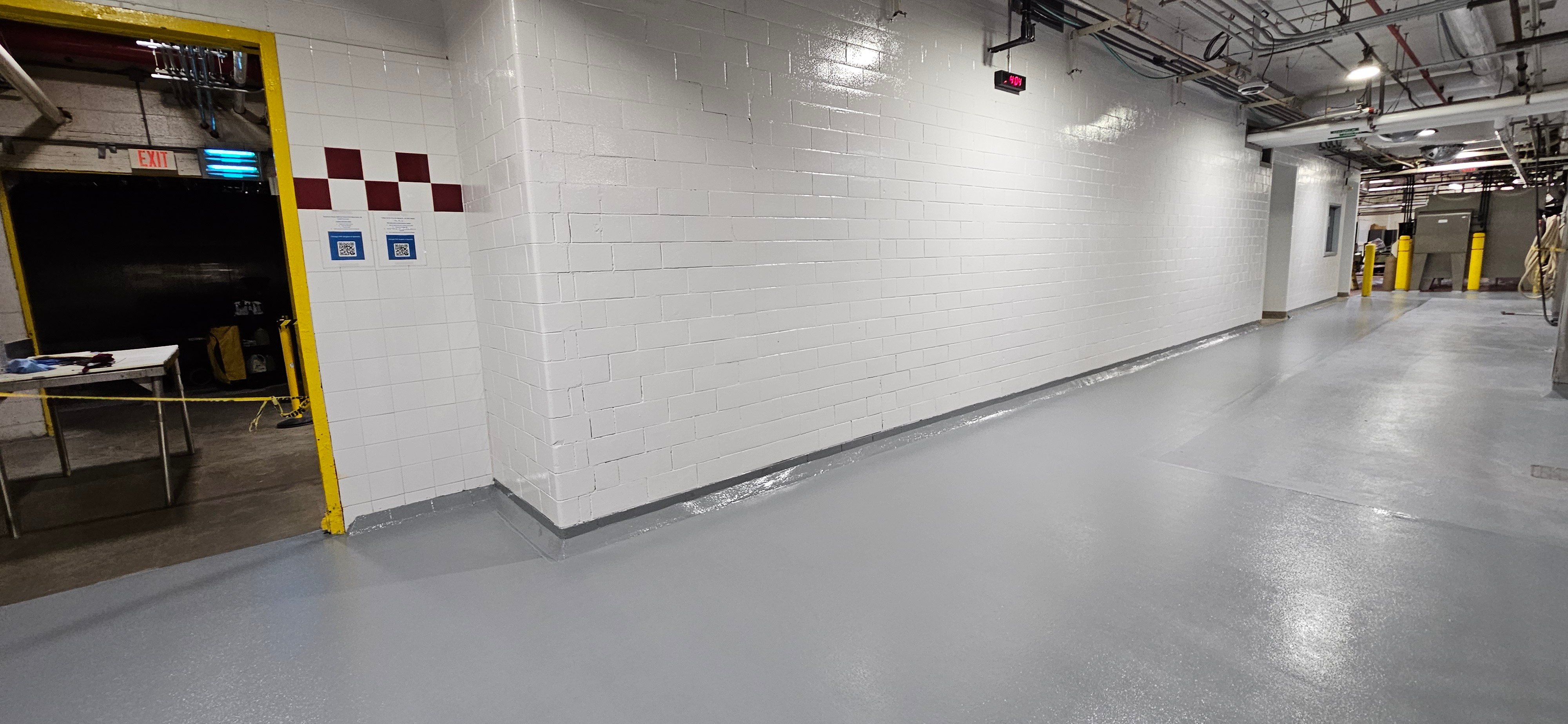What is the Benefit of Urethane Cement Over Other Concrete Flooring Solutions?
June 6th, 2025
3 min read
By Tom Dassie

When choosing a flooring system for an industrial or commercial facility, durability, chemical resistance, and maintenance are all important factors. With so many concrete flooring options available—including epoxy, polished concrete, and traditional concrete—it can be difficult to decide what’s best for your space. One solution that continues to stand out is urethane cement.
At CustomCrete, we install high-performance urethane cement systems for businesses throughout the Chicago area that need flooring tough enough to handle harsh environments. In this blog, we’ll explain what urethane cement is, how it compares to other concrete flooring systems, and why it may be the right fit for your business.
What is Urethane Cement?
Urethane cement, also known as urethane mortar, is a hybrid flooring system made from a combination of urethane resins and cementitious materials. The result is an incredibly durable and chemically resistant surface that bonds tightly to concrete and can withstand a wide range of industrial demands.
Because of its strength and thermal shock resistance, urethane cement is often used in food processing, pharmaceutical, manufacturing, and chemical handling facilities—spaces where other floors might fail under pressure.
Key Benefits of Urethane Cement
Urethane cement stands out for its unique combination of performance features that make it ideal for demanding environments. Here are the most notable advantages:
1. Extreme Durability
Urethane cement can handle heavy foot traffic, forklifts, dropped tools, and more. It resists abrasions and impact better than many epoxy coatings and traditional sealers, making it ideal for high-use environments.
2. Superior Chemical Resistance
If your facility uses corrosive chemicals, sanitizers, or solvents, urethane cement provides a high level of protection. It resists acids, alkalis, oils, and fats that would otherwise damage or stain ordinary concrete surfaces.
3. Thermal Shock Resistance
In environments where hot water, steam, fryers, overs, or refrigeration cycles are common, urethane cement shines. Unlike epoxy, which can crack or delaminate from sudden temperature changes, urethane cement remains stable—even during frequent washdowns or exposure to ovens and freezers.
4. Moisture Tolerance
One of the unique advantages of urethane cement is its ability to bond well to damp or moisture-prone concrete. This makes it a reliable solution for facilities that can’t afford downtime due to slab moisture issues.
5. Slip-Resistant and Sanitary
Urethane cement systems can be installed with a textured finish to increase slip resistance, which is especially important in food and beverage plants. It also offers a seamless, non-porous surface that reduces the risk of bacterial growth.
6. Long-Term Cost Savings
Though urethane cement has a higher upfront cost compared to some other systems, it typically requires fewer repairs and lasts longer. This lowers total lifecycle costs and reduces operational disruption over time.
Urethane Cement vs. Other Concrete Flooring Solutions
Let’s compare urethane cement to other popular flooring systems:
Epoxy Flooring
- Durability: High, but less impact-resistant than urethane cement
- Chemical Resistance: Moderate to high, depending on formulation
- Thermal Resistance: Limited—can fail under thermal shock
- Best Use: Warehouses, showrooms, and dry manufacturing
Polished Concrete
- Durability: Excellent under foot traffic; less resistant to impact or chemicals
- Chemical Resistance: Low to moderate, depending on sealer used
- Thermal Resistance: Moderate, but can be compromised by heavy equipment or repeated spills
- Best Use: Offices, schools, and retail environments
Traditional Concrete with Sealers
- Durability: Basic protection; wear and tear can occur over time
- Chemical Resistance: Low unless regularly re-sealed
- Thermal Resistance: Limited
- Best Use: Light-duty areas or spaces with low exposure to contaminants
Compared to these systems, urethane cement offers the most balanced solution for facilities requiring superior performance under extreme conditions.
When Should You Consider Urethane Cement?
Urethane cement is ideal for businesses that:
- Handle frequent high-temperature washdowns
- Use or store chemicals, solvents, or oils
- Need a flooring system that can tolerate moisture or humidity
- Require a sanitary, easy-to-clean surface
- Want long-term performance without frequent maintenance
Final Thoughts
Choosing the right flooring system is essential for the safety, efficiency, and longevity of your facility. Urethane cement stands apart from other concrete flooring solutions thanks to its durability, thermal resistance, and chemical protection. While it may involve a higher initial investment, the long-term benefits often outweigh the cost.
At CustomCrete, we help businesses in Chicago and beyond evaluate their flooring needs and install the systems that best match their environments. Whether you're exploring urethane cement for the first time or comparing it to epoxy or polished concrete, our team is here to provide guidance.
Want to learn if urethane cement is right for your facility? Visit our next article on “Cost of Urethane Cement from CustomCrete in Chicago, Illinois”.
Topics:









.jpg?width=7008&height=4672&name=CC101560%20(1).jpg)









.jpg?width=2048&height=1365&name=CC103622%20(2).jpg)
.jpg?width=1200&height=1600&name=Copy%20of%20IMG_1457%20(1).jpg)



